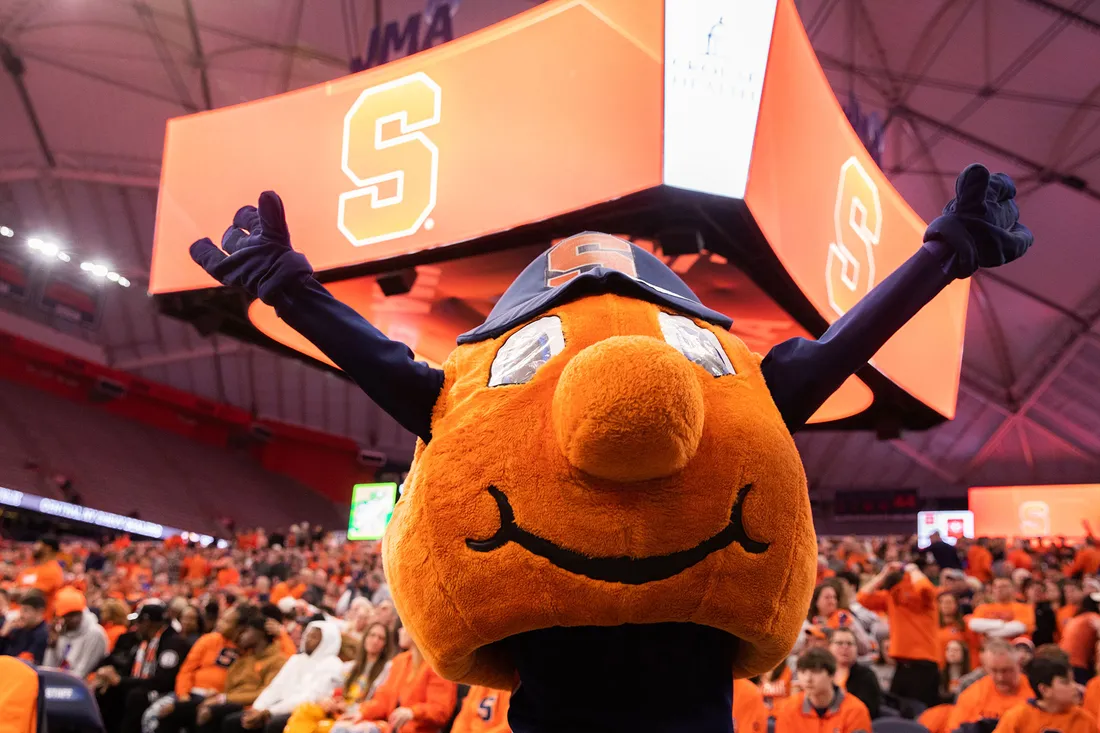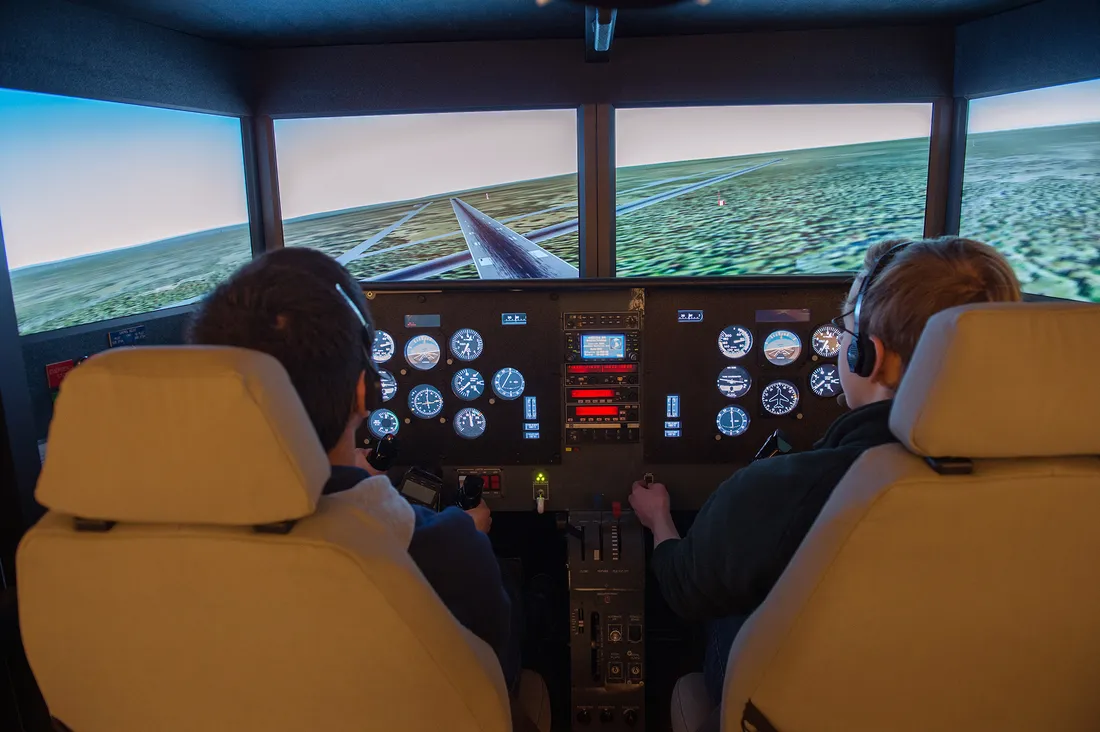
Soar to excellence, while expanding your worldview, with courses like Introduction to Space Flight.
Picture yourself along a massive coral reef, photographing exotic marine life. Hurtling through space in a futuristic flight simulator. Coming face to face with priceless Renaissance art in a museum in Florence.
These are just some of the many opportunities available to you as a Syracuse University student. Created with you in mind, they reflect our commitment to holistic education—developing the person first, the student second.
Here's a small slice of what it means to be Orange.
Introduction to Space Flight
Syracuse University enjoys a rich legacy of aerospace success—from the construction of the world’s first commercial flight simulator by Edwin Link H’66 to the training of such NASA pioneers as Eileen Collins ’78, H’01 and Story Musgrave ’58, H’85. We also have state-of-the-art labs and facilities, like the Fidelity MOTUS 622i flight simulator and subsonic and supersonic wind tunnels. Offered by the College of Engineering and Computer Science, Introduction to Space Flight (AEE 577) teaches you space flight basics, including mission design, orbit determination and flight path control. The experience is out of this world!
The Knight-Newhouse College Athletics Database Project
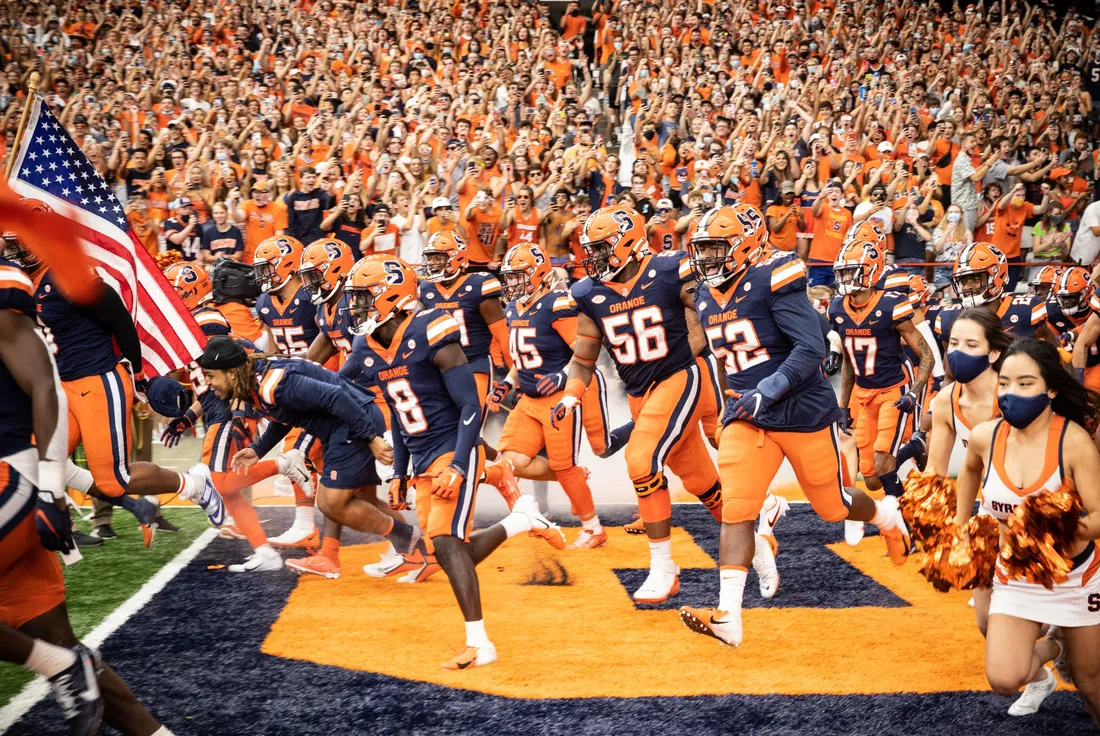
The Knight-Newhouse College Athletics Database project follows revenue and spending at more than 230 Division I programs, including Syracuse’s.
College sports rake in millions of dollars for universities each year. But for all the money generated by lucrative television contracts, ticket sales and licensed apparel, few athletics programs operate in the black. Master the X’s and O’s of college sports finance with the Knight-Newhouse College Athletics Database project in the S.I. Newhouse School of Public Communications. Thanks to a generous grant from the John S. and James L. Knight Foundation, the project follows revenue and spending at more than 230 Division I programs, including Syracuse’s. “The project underscores our commitment to training students in the important field of data journalism,” says Newhouse Dean Mark J. Lodato. Offered in conjunction with Sports Data with USA Today (MNB 300/600 and BDJ 300/600).
Mediterranean Food and Culture: A Florence Experience

Located in the birthplace of the Italian Renaissance, the Florence program offers an array of experiential learning opportunities.
Mediterranean society has long embraced three basic ingredients: olives, wheat and grapes. Used to make oil, bread and wine, this dietary trinity is often paired with fish, seafood and dairy to promote positive health and well-being. Learn more about this popular diet in Mediterranean Food and Culture: A Florence Experience (NSD 452/652). Offered by the David B. Falk College of Sport and Human Dynamics in conjunction with the Daniel and Gayle D’Aniello Syracuse University Program in Florence, the course views nutritional science through the lens of anthropology, geography and history. Priority given to food studies, nutrition science and related majors.
Special Topics in Computer Art: Reality Capture
Get a new lease on your creativity with Reality Capture (CAR 530). Offered by the College of Visual and Performing Arts, the course focuses on a new discipline that lets you create ultra-realistic 3D models from images or laser scans. Small wonder that almost everything you see today on television and film and in video games—from virtual reality scenes and textured 3D meshes to orthographic projections—is the result of Reality Capture. Learn the secrets of Hollywood’s VFX gurus, while infusing your own work with eye-popping precision and accuracy.
Blockchain Management
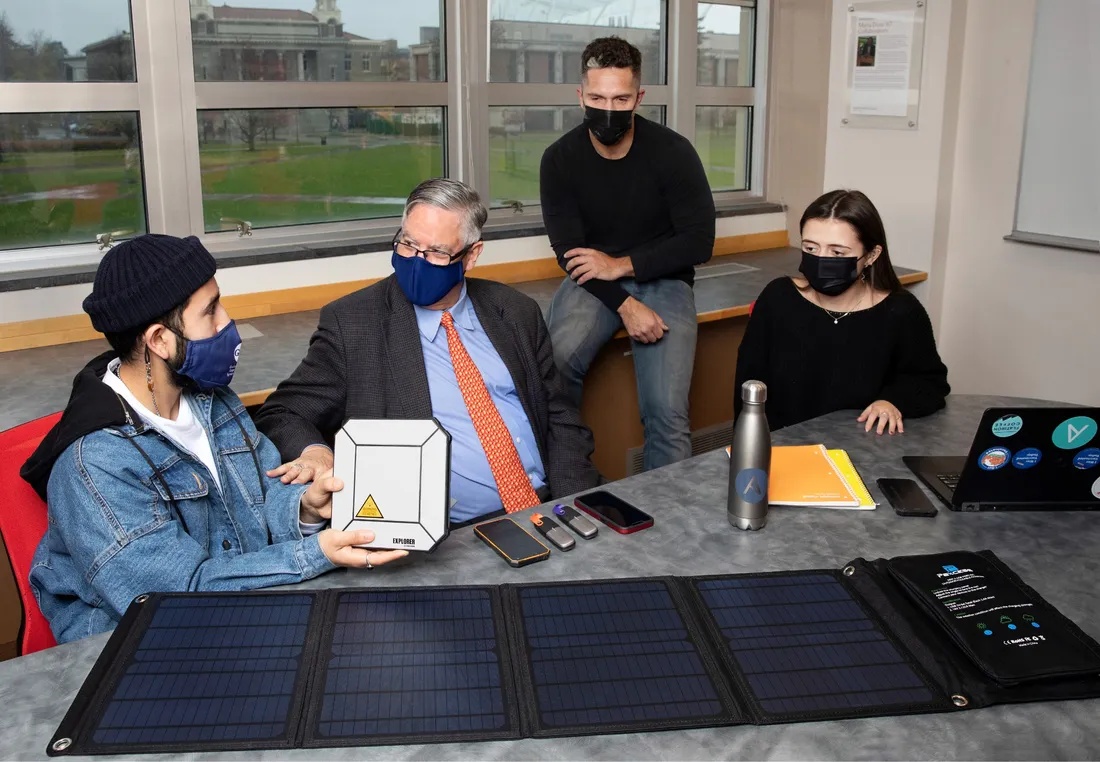
Associate Professor Lee McKnight (second from left) created Blockchain Management in response to the technology’s widespread popularity.
The first course of its kind in the world, Blockchain Management (IST 408/608) has catapulted the School of Information Studies to the forefront of blockchain teaching and research. The first half of the course is devoted to labs, lectures and readings; the second half, inspired by the TV reality show Shark Tank, invites you to pitch original business ideas to guest judges. “By the end of the semester, everyone knows how to write a smart contract,” says Associate Professor Lee McKnight, referring to code that carries out instructions on a blockchain. He created the signature course in 2017 in response to the rising popularity of blockchain—internet technology that lets you track and trade almost anything of value.
Anthropology of Magic and Religion
Shamans. Priests. Prophets. They’re just some of the people you’ll “meet” in Anthropology of Magic and Religion (ANT 373). Offered by the College of Arts and Sciences in conjunction with the Maxwell School of Citizenship and Public Affairs, ANT 373 examines magical and religious behaviors, rituals, and belief systems throughout history. You’ll also learn about witchcraft, healing magic and demonic possession as well as ideologies and innovations practiced by millennial and counterculture movements. Whether you study the anthropology of religion or have a passing interest in the occult, the course is pure magic.
Postcolonial Spaces
Experts agree that architecture and urbanism can help emerging economies assert themselves. The recent proliferation of Asian skyscrapers, for example, not only challenges the supremacy of the American high-rise, but also represents these countries’ new role on the global stage. The School of Architecture’s Postcolonial Spaces (ARC 569) course takes a deep dive into postcolonial architecture and the urban built environment. Along the way, you’ll find out how they are influenced by systematic changes in urban society, economy, technology and governance.
Social Work and the Human-Animal Bond
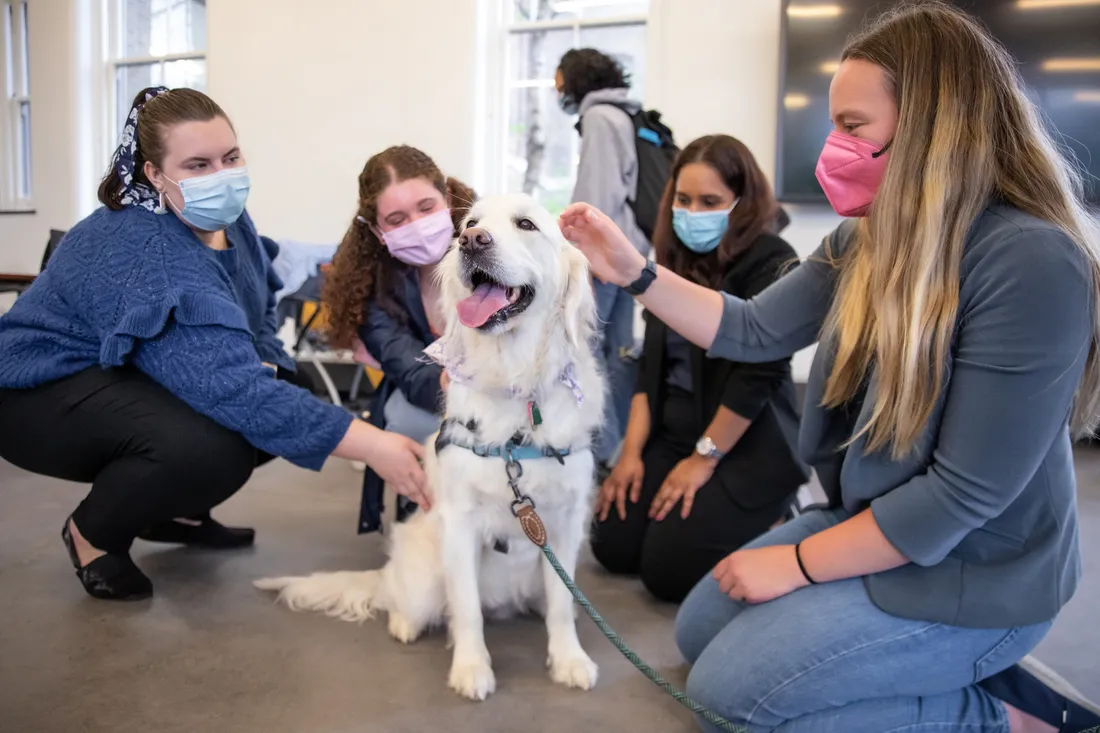
“Nonhuman animals matter deeply in the lives of human animals,” says Assistant Professor Yvonne Smith, who created Social Work and the Human-Animal Bond in consultation with other social work faculty, staff and students.
If the pandemic has taught us anything, it’s that we love our pets. Never mind that these relationships are shown to help lower our heart rate and boost our overall health and well-being. That’s the impetus behind Social Work and the Human-Animal Bond (SWK 403/603), created by Falk professor Yvonne Smith. The course covers a lot of therapeutic ground, from pet-related grief and loss—something veterinarians face daily—to the link between animal cruelty and domestic violence. “We’re just beginning to understand the impact of companion-animals on children, families and the elderly,” she says.
The Bio-Art Mixer
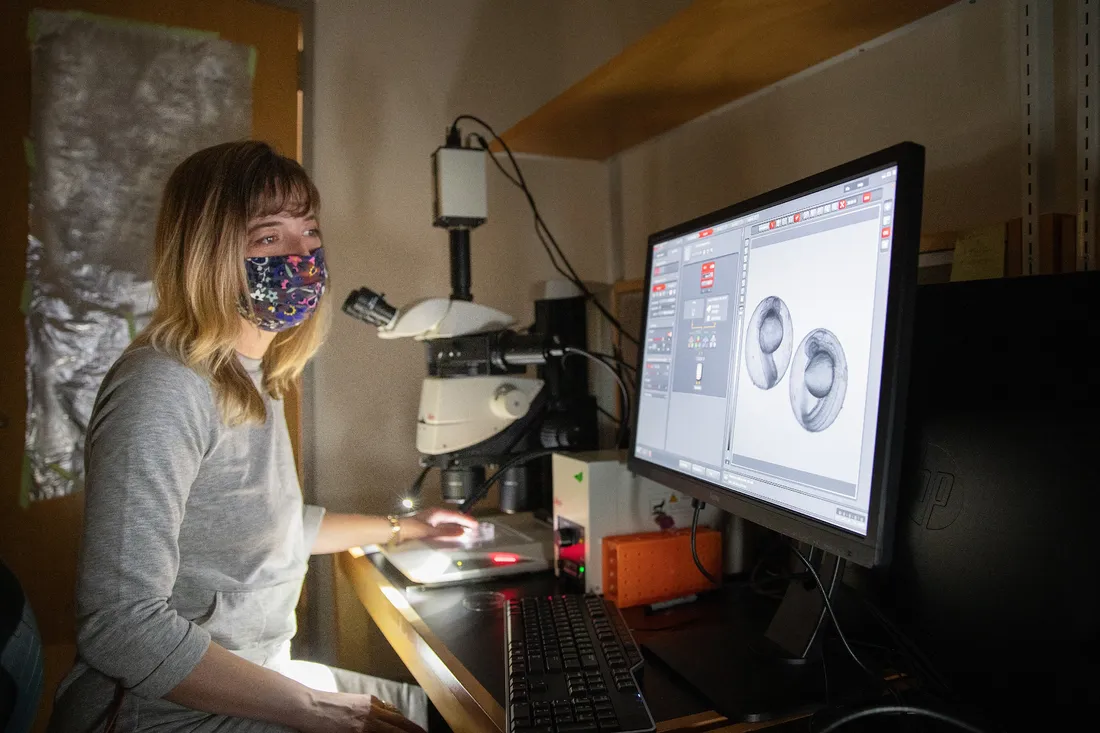
Biologist Heidi Hehnly uses The Bio-Art Mixer to foster ideas for new art and research projects.
Artists and scientists are in the business of creativity, developing original ideas and pushing frontiers. But what happens when they work together? Find out in The Bio-Art Mixer (BIO 400/600), combining techniques and knowledge from the biological sciences with visual and textual expression from the arts. Inspired by the global Bio-Art movement, the course is co-taught by biologist Heidi Hehnly in Arts and Sciences and video artist Boryana Rossa in VPA. “An integrated approach to education that includes art, science and the humanities is imperative for us to understand the world we live in,” says Hehnly, whose course culminates with a public art show. “Whether you have an interest in science, art or both, you get plenty of experience here with microscopy and other cool biological techniques.”
Disability and Popular Culture
A good story entertains and inspires. It also educates. Tales about disability are especially evocative because they provide insight into those who are often devalued, misunderstood or marginalized. The School of Education’s Disability and Popular Culture course (DSP 438) explores representations of disability in books, movies, television, cartoons and journalism. Discover how the media has both helped and hindered the disability community—giving it a sense of identity while perpetuating negative stereotypes.
Blackstone LaunchPad at Syracuse University Libraries
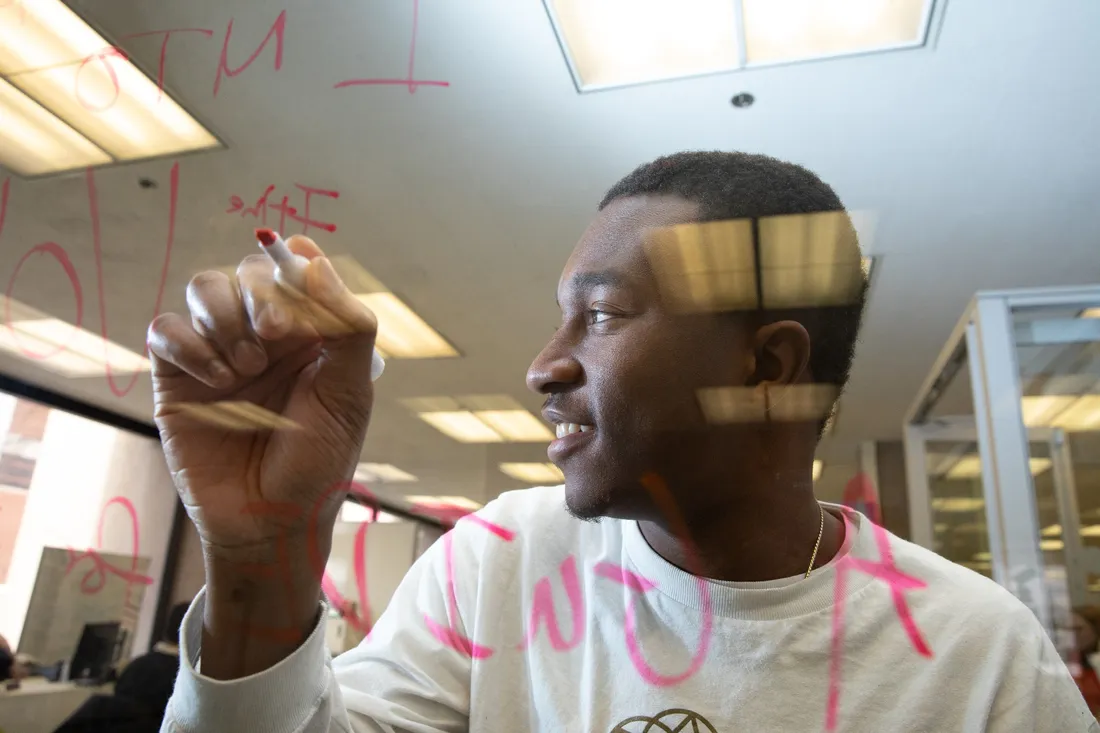
Blackstone LaunchPad at Syracuse University Libraries serves as the campus’ innovation hub, supporting innovators, entrepreneurs and creatives.
Have a cool startup idea? Blackstone LaunchPad can help. Based in Bird Library near the Martin J. Whitman School of Management, LaunchPad is part of a global network of colleges and universities supported by the Blackstone Charitable Foundation. Since 2016, Syracuse’s program has raised more than $94 million in investments for nearly 6,000 entrepreneurs. Dayanna Torres ’06, G’09, director of the Blackstone Charitable Foundation, is proof that you can develop entrepreneurial skills through individualized coaching, ideation and venture creation support. The Whitman School also offers a LaunchPad course (EEE 453/653).
Sustainable Enterprise Partnership
More than a corporate buzzword, sustainability is a way of life. That’s why the Whitman School has teamed up with three other organizations, including Engineering and Computer Science, to create the Sustainable Enterprise Partnership. Steeped in transdisciplinary teaching and research, this one-of-a-kind program teaches you how the three pillars of sustainability—people, profit and the planet—can deliver long-term business results.
The Architecture of Revolutions
Architecture is more than the built environment. It’s part of our culture—how we see ourselves and the world around us. The Architecture of Revolutions (ARC 334/634) course expands on this idea, surveying architectural theory and practice during the Enlightenment (c. 1600-1800). Professor Jean-François Bédard charts the rise of Neoclassicism, a bold, iconic language marked by symmetry, simple geometry and functional beauty. Learn how the discovery of ancient Greek and Roman sites—and their long-lost building techniques—ignited a series of revivalist styles in France, Germany and England.
Information Technologies
Digital technology is everywhere—from computers, smartphones and tablets to email, social media and the Cloud. But how well do we understand it? Do modern devices and applications truly make us smarter and more productive? Information Technologies (IST 195), offered by the iSchool, brings it all together, providing a broad overview of basic technological concepts and ideas.


